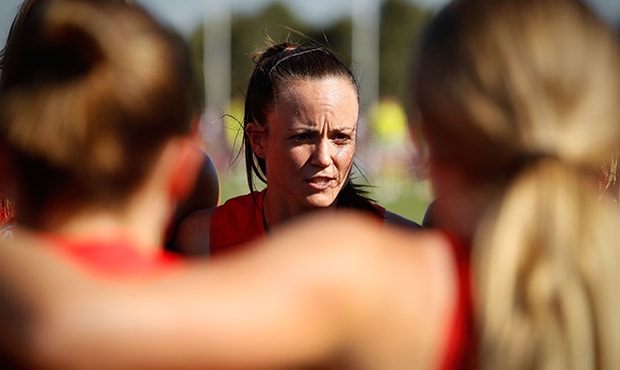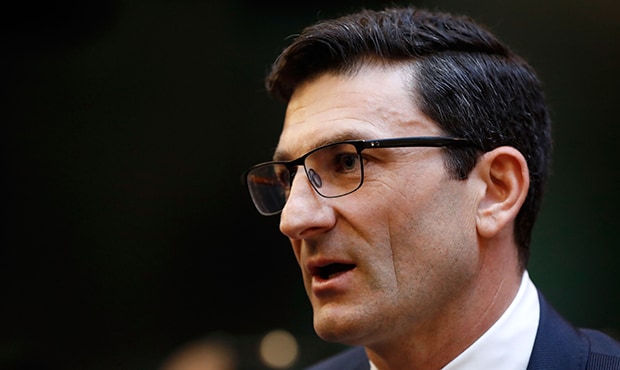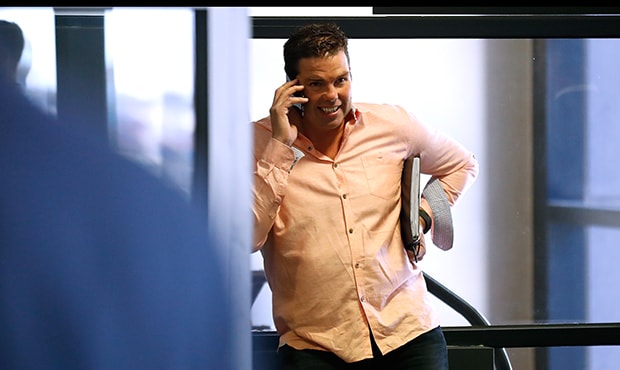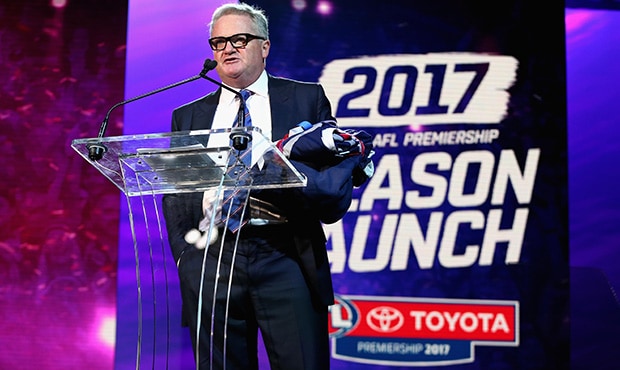WHO ARE the people who shape the modern AFL?
Over summer, senior writer Ashley Browne again extensively surveyed the football industry to find out who pulls the levers to make the game as strong and powerful as it is.
Once again, a wide spectrum of the industry was surveyed, including players and coaches, club and AFL management, journalists and broadcasters, player managers and other key stakeholders directly and indirectly involved in the game.
This is the second year of the survey and once again more than 100 names were thrown up altogether. This year, there are 15 new faces in the top 50, reflecting teams on the up and those whose influence has grown.
Please note that the survey was conducted over summer, before Mike Fitzpatrick retired as AFL Chairman and Mark Evans moved on from heading up the League's football operations to become chief executive of Gold Coast. There have subsequently a raft of changes at the executive level of the AFL.
Once again, some of those with a common interest and have been ranked together.
30. David Koch
Port Adelaide chairman, TV host
Last year: 26
Port Adelaide has no greater salesman than the business journalist-cum-breakfast TV host, now entering his fifth season at the helm at Alberton. The days of the tarpaulin-covered seats at Football Park are long gone and the Power are a joint tenant at Adelaide Oval and the equal of Adelaide in pretty much every key performance indicator. "He just doesn't accept second-team status," said one AFL source. "He opens doors that were previously closed to Port," added a close observer of the club. Koch is based in Sydney, where he creates his vision for the Power, but others such as vice-chairman Kevin Osborn and chief executive Keith Thomas have also played key roles in the growth of the club. An indication of Port's standing and a testament to Koch's leadership and vision is the round eight match against Gold Coast in China. The AFL has beaten the NFL, NBA, Major League Baseball and the English Premier League, among others, to be the first sporting league to play an official game in the world's biggest country and it wouldn't have happened, at least not this year, without Koch's prodding.
29. Craig Kelly
Player manager
Last year: 31
A quick scan of the TLA website shows more than 150 players and a few coaches as part of the stable. And it is about to get bigger with a merger with Stride Sports, another major AFL player management company, about to be finalised. The former Elite Sports Properties is now a big part of a huge global enterprise and Kelly remains at the helm in Australia for another three years as part of the management agreement. He sold the business for a considerable sum and the earn out provisions mean he could make considerably more if the business reaches certain targets under his watch. Kelly's influence in the media has also been profound. Rebecca Maddern is now a co-host of The Footy Show, while he also helped broker the shake-up at SEN Radio that saw Garry Lyon and Hamish McLachlan parachuted into the morning show. Kelly's name continues to be linked to Collingwood, where he was a premiership defender, as the eventual replacement for Eddie McGuire, but their conversations behind closed doors must be fun given SEN's bid to capture a slice of the Triple M audience where McGuire hosts the breakfast show.
28. John Longmire
Sydney coach
Last year: -
Longmire is a great coach. The Swans don't want to run the risk of slumping while rebuilding in the brutal Sydney sporting market and keep presenting year after year with super-competitive teams that have made three of the last six Grand Finals. His winning rate of 66 per cent is the second best of active AFL coaches behind only Geelong's Chris Scott. Longmire doesn't have as shrill a voice as some of his colleagues, but when he speaks up, such as his recent remarks about full-time umpires, people in the game tend to listen.
27. Matthew Pavlich
AFLPA president, retired Fremantle champion
Last year: 28
After 353 games and 700 goals, Pavlich finally called time on his 17-year career with Fremantle at the end of last season. But there is plenty going on to keep him immersed in the affairs of football. He remains the president of the AFL Players Association and he is deeply involved in negotiations for the new Collective Bargaining Agreement. At some stage this year he will hand the AFLPA reins to either Patrick Dangerfield or Rory Sloane, leaving his main football involvement as a WA-based commentator for Fox Footy. But think of this as a gap year. Bright, personable and ambitious, and soon to have an MBA in his back pocket, a career in football administration beckons. And he will be very, very good at it.
26. Darren Birch
AFL General Manager, Growth, Digital and Audiences
Last year: -
The renegotiated media rights deals brings in the huge earnings every five years or so, but critical to the AFL's bottom line each year is the revenue from the AFL's corporate partners and general consumers, and until recently that was Birch's domain. As part of the recent management restructure his role turns more outwardly focused as he seeks to grow the AFL's brand and reach. At one time, Birch was the Brisbane Lions membership manager, so he brings a sharp consumer focus to the role.
25. Andrew Ireland and Andrew Pridham
Sydney chief executive and president
Last year: -
Ireland is well regarded in the footy industry for his deep knowledge of the game and its history, but not being beholden to it as the Swans establish arguably the most respected club in the competition. Sydney is an incredibly well run club that attracts excellent people on and off the ground and Ireland deftly negotiated the deal that extricated the club from its ANZ Stadium contract in order to play 11 home games at the SCG. And they arguably have the most impressive list of major corporate partners, headed by QBE but also including Volkswagen and Citibank. Pridham had big shoes to fill three years ago when he replaced Richard Colless as chairman, but the club has barely skipped a beat and by various measures is now the largest sporting club in New South Wales. It is a crucial market/battlefield for the AFL and the club could not be in better hands.
24. Daisy Pearce
Melbourne Football Club captain
Last year: 49
The aspirational face of AFLW, Pearce is a marketer's dream. She has deals with NAB and Cotton On and there could be more to come. She comes off as natural and presentable, but on the field she moves smoothly, averaging 22.2 disposals a game (No.2 in the competition) and top three in the competition for centre clearances and tackles. As well as she has played, Pearce is now at the back end of her career. "A bit like Chris Judd at 29 rather than 25," said one observer. "If the women's league had started five years earlier we would have seen just how good a footballer she was." When the history of AFLW is one day written, Pearce's influence might end up being more profound off the field than on, with 354 new women's teams taking the field in 2016.
Daisy Pearce is one of the AFLW's biggest names. Picture: AFL Photos
23. Brian Cook
Geelong chief executive
Last year: 16
The good news for the Cats is that Cook isn't likely to go anywhere. Just about every other AFL club – and a few others sports as well - had a nibble at the man largely responsible for transforming West Coast and then Geelong into financial and football powerhouses. Racing Victoria made some enquiries about the vacant CEO job there and he shaped as the ideal candidate to replace Stephen Gough at the helm of the Melbourne Cricket Club, a position that was eventually filled by Hawthorn boss and Cook protégé, Stuart Fox. At 60, it us unlikely he will be swayed by any other position. The Cats continue to hum along, and a new grandstand at Simonds Stadium encompassing the football department will open on May 19. The timing will be tight – the Cats only take possession a week before – but given how much redevelopment has taken place at Kardinia Park in his 18 years in charge, the bump in will be seamless. The re-signing of coach Chris Scott and the quest for an AFLW team as soon as possible, will keep him busy in 2017.
22. Richard Goyder
Incoming AFL chairman
Last year: 14
The soon-to-be chairman of the AFL (this survey was completed before news of his ascension) loves to talk of his crowning achievement as a player, captaining the Tambellup under 12s to 2.1 (13) to 1.0 (6) Grand Final win over Police Boys. That early success served him well and away from footy he rose all the way to becoming managing director of Wesfarmers, Australia's largest company. Goyder is universally well regarded and has succeeded in business without having (at least in public) the hard edge of so many of his peers. "He's not a prick," said an observer of Goyder in both his business and football guises. He is comfortable in front of a camera and there is no doubting his love of the game, as a former amateur footballer in Western Australia and board member of the Dockers. At an AFL staff presentation last year, he even joked (we think) about the purple underwear he wears in honour of the Dockers. His local knowledge will come to fore early as he signs of the deal for the new Perth Stadium and there is Etihad and the CBA that will be on his plate as well. Early prediction: he won't be No.22 this time next year.
21. Travis Auld
AFL Chief Financial Officer and General Manager of Clubs
Last year: 25
Hand-picked to join the AFL from the Suns three years ago, Auld carries a wide brief at the AFL but it his relationship with the clubs that forms the chief part of his portfolio and continues to be so following the recent executive restructure. Working hand in glove with the clubs has been a particular focus of the AFL in Gillon McLachlan's time as chief executive, and there is certainly less griping these days by the clubs about some of the decisions made by head office. Auld has also produced an enticing fixture for 2017 and round one is in line to be the most attended and watched ever.
Travis Auld handles the tough job of fixturing all matches. Picture: AFL Photos
20. Peter Blunden
Herald & Weekly Times managing director
Last year: 35
The beauty of the Herald Sun, even though newspapers themselves are battling, is that it still recognises what most gets Victorians up and engaged – crime and football. Blunden hasn't called the shots on the editorial floor for some time, but he makes sure the Melbourne tabloid has all the resources it needs to cover the AFL extensively and the 'back page of the little paper' is the place clubs still prefer to be if they want to make a splash and where not to be when bad news breaks. "If Gill gets a call from the Herald Sun, he jumps," said one AFL insider. The partnership between the AFL and the paper is very fraternal, as indicated by blanket coverage of AFLW that other sports would kill for. "He provides publicity and promotion no amount of money could buy," said one commentator.
19. Ray Gunston
AFL General Manager, Infrastructure, Major Projects and Investment
Last year: -
The AFL had long been itching to buy Etihad Stadium, but it was only after Gunston came aboard that the deal was done. "There's no way we get the deal done without him," said one observer. "He was a joy to watch during the negotiations." Gunston's willingness to use debt to finance the $200 million deal was the clincher and he was able to convince the executive and the commission that the deal could be comfortably serviced. It is the biggest deal the AFL has ever done apart from the broadcast agreements and the League is promising a better fan experience at Etihad from this season on. Next on his agenda is the Collective Bargaining Agreement, which must make for an interesting dinner table conversation when son Jack, the star Hawthorn forward, visits for a meal. Tied up with the CBA is the investment model for the next six years, which Gunston is also overseeing. "It's not just about how we spend the money," said another observer. "This is a gilt-edged opportunity to grow the game for a generation."
18. Paul Connors
Player manager
Last year: 27
From his nondescript office in Malvern, Connors continues to manage a large and powerful stable of AFL players. He has come off another successful year, which included Michael Hurley recommitting to Essendon when it appeared that he had one foot out the door and Josh Kennedy becoming the new captain of Sydney. The deal that sent the famous son and grandson of Hawthorn to the Swans in 2010 rates as the best he has ever done. Connors managed nine of the first 16 players selected in last year's national draft and his strength at attracting players from Melbourne's leading private schools is second to none. And having seen Chris Judd into a comfortable – and lucrative – post-football career, he might well be doing the same with Luke Hodge at the end of this year.
Paul Connors has managed some of the AFL's biggest stars. Picture: AFL Photos
17. Mark Robinson
Journalist, TV host
Last year: 13
'Robbo' is everywhere. He's chief football writer of the Herald Sun, one of the most prestigious jobs in all football media. He co-hosts AFL 360, the nightly, agenda-setting and opinion-shaping show on Fox Footy. And he appears widely on SEN, including Crunch Time, the Saturday morning show that has become almost compulsory listening. Footballers enjoy talking to Robinson, who in turn will talk footy to, well, anyone and everyone. "He's authentic," noted one Melbourne sports broadcaster. "He speaks on level terms with his audience. He is also prepared to ask hard questions and take unpopular positions. You may disagree with him, but I've never had anyone convince me that he isn’t honest." The unpopular position aspect is right. Robinson has been strong in his support for James Hird throughout the Essendon supplements saga and sceptical of ASADA and the AFL, a stance increasingly at odds with that of most people in the game.
16. Luke Beveridge
Western Bulldogs coach
Last year: -
What an extraordinary story. Since taking over as coach of C-Grade Victorian amateur club St.Bedes/Mentone in 2006, teams he has coached or been part of the coaching panel have won seven premierships. The greatest of the lot was the Western Bulldogs triumph in last year's AFL flag decider, only the second in the club's history and the first since 1954. His secret? He coaches his players really hard, but his love and care for them is self-evident. His handing of his premiership medallion to injured skipper Bob Murphy will go down in Grand Final lore. But at a time when some believe the role of senior coaches is veering more towards the style of soccer management, Beveridge's match day work and tactical nous is becoming renowned and his stamp might be the fast handball game that was so irresistible last September. Early signs are that many teams will try to emulate this in 2017.
15. Simon Lethlean
AFL General Manager, Football Operations
Last year: 15
When Gillon McLachlan decided he wanted to bring forward the launch of AFLW from 2020 to this year, he turned to Lethlean, who was still finding his feet in the game development chair at the AFL after several years in charge of broadcasting and the fixture, but whose strong background as a player and coach at Old Xaverians made him an ideal choice to steer grassroots football. And Lethlean is now riding high after a debut season more successful and spectacular than anyone could have imagined. "Gill put him under pressure but he did it," said one AFL executive. "Game development was a 'renovators delight' before Simon took over," said another AFL colleague. "There were lots of things that hadn't been looked after but he has really turned things around. He has the runs on the board." His reward was the move to head up football operations, widely considered to be the second most important role at the AFL, following the departure of Mark Evans to Gold Coast.
14. Peter Gordon
Western Bulldogs president
Last year: 20
How good a year did he have? Let's count the ways:
1. The premiership.
2. An operating profit of $3.64 million.
3. Net debt slashed from $8.3m to $1.9m.
4. The AFL signed off on the first Bulldogs home game for premiership points in Ballarat, to be played in round 22 this year at Eureka Stadium.
Gordon holds enormous sway in footy these days. Gillon McLachlan uses him as a sounding board, and he is also on advocate for the game with the Victorian government given his close ties to the ALP. His management ethos is not for everyone; he maintains an office at the Whitten Oval and highly-rated Nike executive David Stevenson lasted barely a year as his chief executive after moving from the United States. "His style is autocratic but it clearly works because the turnaround has been amazing," said one AFL insider. "People don't worry about them going out of business any more." In his first iteration as Bulldogs president in the early 1990s, Gordon was a brash street-fighter. This time around he operates with a bit more polish and his hair has turned grey, but he is still a man of the people. How many other club presidents would work the till or make a quick dash to the shops when supplies run short during an AFLW match?
Peter Gordon enjoyed a pretty successful 2016 season. Picture: AFL Photos
13. Craig Hutchison
Crocmedia chief executive, Footy Show co-host
Last year: -
Hutchison has always believed in the power of radio and his Crocmedia emerged as a clear winner when the AFL renegotiated its radio rights at the end of last season, helping to double the annual rights fee in the process to almost $10 million. AFL Nation will now broadcast twilight matches on Saturdays and Sundays across Australia on a variety of stations, both metropolitan and regional. and as part of the deal, his nightly networked Sportsday show was merged with the influential and popular Sports Today on 3AW, keeping Gerard Healy and Dwayne Russell as hosts. However, that's only half the story with Hutchison, who in a bloodless coup late last year was installed as the new co-host of The Footy Show, replacing James Brayshaw. Expect TFS to return back to the sharper, news-breaking focus that was the norm when Eddie McGuire was host in its heyday. How Hutchison juggles his various roles as businessman, AFL partner, TV host and journalist will be something to watch in 2017.
12. Rupert Murdoch/Foxtel/Fox Sports
Executive chairman, News Corporation
Last year: 10
The big boss formally gets the nod here, but it is also a recognition of the huge role Foxtel (half owned by News) and Fox Sports (fully owned) play in the game. Murdoch himself would likely struggle to tell the difference between a Sherrin and a Steeden but he understands the importance of AFL to the Australian sporting and media landscape and has backed the code accordingly. Patrick Delany is the head of Fox Sports and under his watch, Fox Footy and its blanket 24-7 coverage has become indispensible for anyone with even a half-baked interest in the game. This year, it has spawned its first imitator with Fox League now covering the NRL in similar detail. A new development in the relationship between News and the AFL this year is the revamped WatchAFL website and app, which in addition to streaming live games, will offer Fox Footy programming to footy-started expatriates around the world.
11. Patrick Dangerfield
Geelong champion, Brownlow medalist
Last year: -
The prototype modern footballer. Dangerfield shattered a few myths in 2016, chiefly that footballers need to shy away from the limelight to play their best footy. The more media and promotional work Dangerfield did, the better he seemed to play and his first season with Geelong, having crossed to his home town team after a great career with Adelaide, resulted in a resounding win in the Brownlow Medal and a top-four finish for the Cats. Witness his spectacular surfing commercial for Fox Footy, his co-hosting the live pre-draft show on AFL.com.au and his active and engaging presence on social media. Dangerfield is also among the leading lights in the AFL Players Association – and the likely next president – and is playing a big role in the negotiations for the next Collective Bargaining Agreement. "When was the last time the best player in the competition was so entirely engaged in every area of footy?" said one high-profile commentator.


